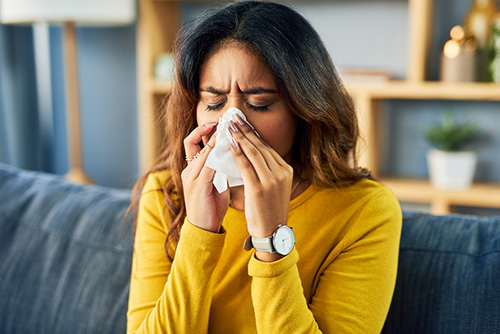- Empty cart.
- Continue Shopping
A Guide to Understanding Allergies in Women

Allergies are a common health issue affecting millions of people worldwide. While allergies do not discriminate based on gender, there are some unique considerations for women. Hormonal fluctuations, life stages, and even societal roles can influence how allergies manifest and are managed in women.
The Biological Factors: Hormones and Immunity
Hormonal Fluctuations
Women experience various hormonal changes throughout their lives, such as during menstruation, pregnancy, and menopause. These fluctuations can impact the severity and frequency of allergic reactions.
Immune System Differences
Research suggests that women generally have stronger immune responses than men, which can be both a blessing and a curse. While a robust immune system can fend off infections more effectively, it can also lead to more intense allergic reactions.
Common Allergies in Women
Food Allergies
Common food allergies among women include nuts, shellfish, and dairy. Hormonal changes can sometimes exacerbate these allergies.
Environmental Allergies
Pollen, dust, and pet dander are typical environmental allergens that can affect women. These can be particularly troublesome during pregnancy when the immune system is in a state of flux.
Skin Allergies
Women are often more susceptible to skin allergies due to the frequent use of various skincare and cosmetic products, which can contain allergens or irritants.
Diagnosis and Treatment
Allergy Testing
If you suspect you have an allergy, consult a healthcare provider for proper diagnosis, which may include skin tests or blood tests.
Medication
Antihistamines are the most commonly prescribed medication for allergies. However, it’s crucial to consult a healthcare provider for personalized treatment, especially if you’re pregnant or breastfeeding.
Immunotherapy
For severe allergies, immunotherapy, also known as allergy shots, may be recommended. This long-term treatment aims to desensitize your body to specific allergens gradually.
Lifestyle Considerations
Diet and Nutrition
A balanced diet rich in anti-inflammatory foods like fruits, vegetables, and omega-3 fatty acids can help manage allergy symptoms.
Stress Management
Stress can exacerbate allergies. Techniques like mindfulness, meditation, and exercise can help manage stress levels.
Home Environment
Keeping your living space clean and free from allergens like dust and pet dander can go a long way in managing symptoms.
In conclusion, understanding allergies in women requires a multi-faceted approach that considers biological, environmental, and lifestyle factors. While allergies can be challenging to manage, a combination of proper diagnosis, medication, and lifestyle changes can help you lead a more comfortable life.
If you’re a woman dealing with allergies, remember that you’re not alone. Consult a healthcare provider for a tailored treatment plan and consider joining support groups or forums to share experiences and coping strategies. With the right information and support, managing allergies becomes a more navigable journey.








